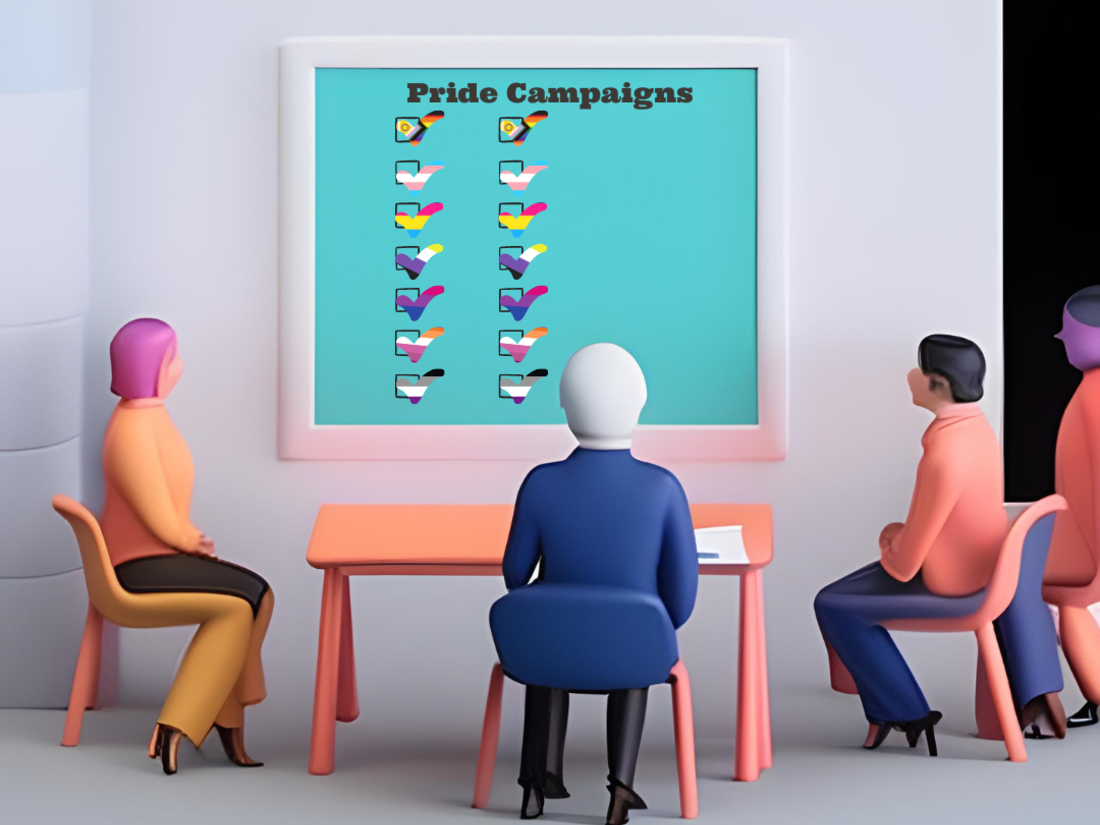Menu


As we enter Pride Month and the iconic rainbow colours fill our streets and screens, we want to highlight some concepts your organisation might be unintentionally embracing: ‘rainbow-washing’, the ‘pink pound’ and ‘gay for the day’. These terms may be completely new to you, but don’t worry, we’ll explain exactly want they mean as well as the impact they have on LGBTQ+ employees and your organisation.

Pride Month commemorates the ongoing struggle for LGBTQ+ civil rights and equal justice, as well as the achievements of LGBTQ+ people. In recent years, it has become a mainstream event celebrated by organisations worldwide. While it’s heartening to see organisations show support for the LGBTQ+ community, it’s crucial to question the authenticity of their actions. Are they genuinely advocating for equality, or are they merely engaging in superficial gestures?
Let’s dive into the rainbow check-in and examine how companies can genuinely foster an inclusive environment.
‘Rainbow-washing’ refers to the practice of organisations adopting LGBTQ+ symbolism and messaging without genuinely supporting the community. This can include using rainbow logos, changing social media profiles, or sponsoring Pride events – all while neglecting meaningful contributions or policy changes. While these gestures may generate positive public relations, they often lack substance and fail to address the systemic challenges faced by LGBTQ+ individuals.
Even if your organisation believes it is doing the right thing, such campaigns can exploit LGBTQ+ themes for profit if they are not backed by genuine support for LGBTQ+ causes through purposeful action.
The ‘pink pound’ or ‘pink money‘ refers to the purchasing power of the LGBTQ+ community. With the global spending potential estimated at $3.9 trillion, organisations have recognised that LGBTQ+ consumers can be loyal to brands that openly support and cater to their community. In theory, the impact of this on their bottom line could be massive.
However, LGBTQ+ consumers want authentic representation and a genuine commitment to inclusivity. The concept of ‘pink pound’ raises concerns about organisations exploiting the community for profit without actually supporting or understanding their needs. It’s important to see Pride and the LGBTQ+ community in general as more than just a way to make money. Besides harming the LGBTQ+ community, surface-level gestures can hurt an organisation’s reputation.
Being ‘gay for the day‘ describes the practice of organisations temporarily adopting LGBTQ+ friendly practices during Pride Month, only to revert to ‘business as usual’ afterwards. This approach is tokenistic and fails to create lasting change.
True inclusion in this sense means continuously breaking down norms that favour heterosexuality and creating a workplace where everyone feels respected and valued, regardless of their sexual orientation or gender identity.
For LGBTQ+ employees, the presence of ‘rainbow-washing’, the ‘pink pound’, and being ‘gay for the day’ can have serious implications. These empty gestures can create a false sense of support, leaving employees feeling marginalised and unheard.
As we know from our neuroscience themes, things like safety, freedom and acknowledgement are essential for a thriving workforce. LGBTQ+ employees often lack the freedom to be their authentic selves at work and the safety to speak freely and be heard.
The lack of genuine action can lead to feelings of tokenism and ultimately erode trust within the organisation. This can increase stress, decrease job satisfaction and even cause employees to leave in search of more inclusive workplaces.
To build credibility and truly support LGBTQ+ employees, organisations must move beyond performative gestures. Here are some key steps to consider:
Listen & Learn: Engage in open and honest dialogue with LGBTQ+ employees and the community as a whole to understand their needs, experiences and expectations.
Embed Inclusivity: Develop comprehensive diversity and inclusion policies that explicitly address LGBTQ+ rights and ensure equal opportunities for all employees.
Provide Resources & Support: Establish employee resource groups, offer LGBTQ+ inclusive healthcare benefits, and provide training on unconscious bias and LGBTQ+ issues.
Embrace Intersectionality: Recognise that LGBTQ+ individuals encompass a diverse range of experiences, including those influenced by race, ethnicity, disability and more. Intersectional support is essential.
Advocate For Change: Actively support LGBTQ+ rights beyond Pride Month, both internally and externally. Engage in community initiatives and support legislation promoting equality. Here at The Happiness Index, we use Employee Voice, our always-on listening tool, meaning our employees have a safe space all year round!
As Pride Month continues, organisations must conduct a thorough rainbow check-in to evaluate their authenticity and commitment to the LGBTQ+ community. Empty gestures and performative actions can harm LGBTQ+ employees and damage an organisation’s credibility. By moving beyond ‘rainbow-washing’, the ‘pink pound’ and being ‘gay for the day’, companies can foster a truly inclusive workplace that celebrates and supports the LGBTQ+ community year-round, not only during international DEI events.
Let’s embrace authenticity and ensure that our actions reflect the true spirit of Pride. Together, we can create lasting change.
Related articles
Get in touch for a quick chat with one of our experts to see how we can help you.
Take our benchmark to map where your organisation is now, and where it needs to be.